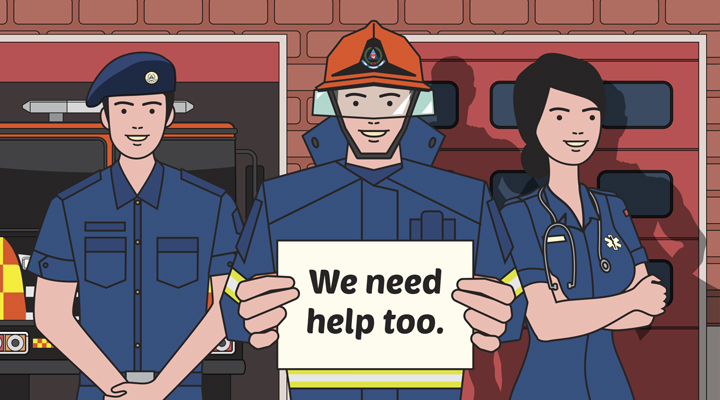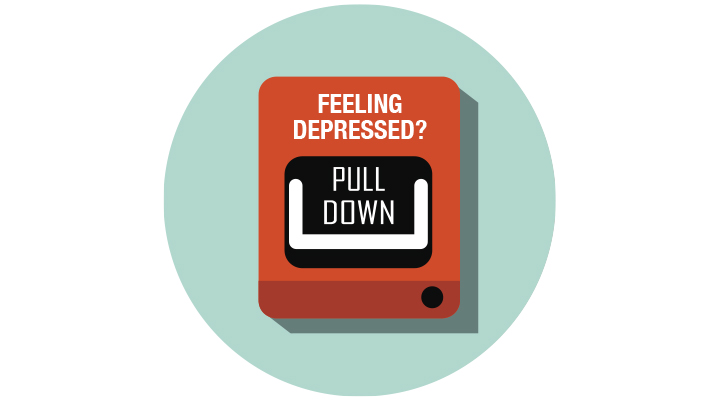Even Heroes Need A Little Help Sometimes

- SCDF has an in-house unit focused on taking care of officers’ mental and emotional wellbeing.
- The in-house unit can respond more quickly and effectively to the needs of officers, and serve as a bridge to supervisors.
- The unit does regular morale sensing and outreach to help officers cope with the stress and challenges of work, such as major operations and being first responders during the COVID-19 pandemic.
- Maintaining the psychological wellbeing of the officers not only enhances operational effectiveness but strengthens organisational resilience.
The SCDF’s emergency responders such as firefighters and paramedics are often seen as indestructible heroes: extinguishing huge blazes, overcoming operational challenges and rescuing people. After incidents are mitigated, the crowds may simply move on with their lives. However, for SCDF officers, those incidents may take a psychological toll on them.
Heroes need support too, and that is where SCDF’s Emergency Behavioural Sciences and Care unit (EBSC) comes in.
Since 2013, the EBSC has been the SCDF’s pillar of emotional and psychological support, seeing the SCDF through major events, mentally demanding operations and even day-to-day situations.
The team of 15 consists of psychologists, researchers and uniformed officers with various areas of expertise: counselling, psychometric assessment skills, critical incident management skills, suicide intervention skills and mental health care.
Supported by several full-time National Servicemen (NSFs), the team’s uniformed officers play a valuable role in fine-tuning training, psychological support plans and interventions to meet the needs of staff, emergency responders and the EBSC.
-ebsc-supporting-ops-lionheart-contingent-(2018).jpg)
Challenges on The Ground
In the SCDF, the operational nature of their roles means that emergency responders may experience challenging issues or a crisis at a moment’s notice. Having an in-house psychological unit provides the responders with a direct access to the EBSC unit.
Frontline officers can potentially become victims to the stresses and mental trauma that come with challenging rescue missions, such as suicides, medical incidents involving young children and serious road accidents.
In the response to COVID-19, paramedics’ morale may be affected by the high workload volume, the discomfort of wearing personal protective equipment (PPE), and having to be on heightened alert for long hours.
EBSC’s main role is to curb these stressors via mental health care and psychological support. The unit acts as a bridge between ground personnel and senior management to enhance SCDF’s effectiveness and resilience.

To accomplish this, a strong sense of trust is key. The EBSC frequently conducts morale sensing and resilience training on the ground, i.e., working closely with supervisors on the psychological aftermath of crises for personnel.
For example, SCDF Ground Commanders find it reassuring that the psychologists are able to support their officers. The commanders would then be able to give their undivided focus on other aspects of the on-going operations.
Ensuring Wellbeing During COVID-19
As first responders during COVID-19, paramedics experience fatigue from having to wear PPE for extended durations of time for every medical emergency that they attend to. They have to manage fears of being at higher risk of infection for themselves and their families, and may at times feel discouraged by the additional challenges that they face.
For instance, paramedics have to learn and implement new, ever-changing instructions as information on the COVID-19 virus evolves. This includes instructions related to safety procedures and medical conveyance protocol. They also have to work under a lot of public attention whenever they attend to suspected COVID-19 medical incidents.
The EBSC implemented a psychological support plan that includes regular morale sensing and wellbeing calls to frontliners.
Prior to COVID-19, the EBSC teams engaged personnel face-to-face at their workplace to get a sense of their operational morale. This gave the EBSC teams a first-hand experience of the working environment and the overall atmosphere for the personnel.
Since the pandemic, morale sensing has been conducted through FormSG surveys. To ensure a human touch, the teams also conduct phone interviews. The information collected is made anonymous and promptly delivered to senior management for follow-up.
Ms Diong Siew Maan, Senior Principal Psychologist with the EBSC, said: “Constant engagement with our frontline supervisors and staff helps to build relationships. The officers and supervisors know that the EBSC uses knowledge from psychological principles to support them, their staff and their work.”
To keep staff connected and informed, the team also sends out bi-weekly newsletters containing infographics on stress management, personal mini-interviews with unit directors as well as tips for enhancing one’s psychological immunity against COVID-19.
Mental Resilience in Times of Crisis
Beyond COVID-19, the EBSC plans their psychological support around critical incidents, both personal in nature, such as the passing of a colleague or a serious on-the-job injury, and for large-scale operational events, such as summit meetings or the National Day Parade.
The EBSC also provides workplace counselling to officers and staff in the organisation. High counselling workloads are usually a result from stressful adjustments to the nature of the work.

On one occasion, a young teen’s suicide left the first responders emotionally scarred. Another incident saw a firefighter injured during the firefighting process when the vehicle exploded into flames. In these instances, the EBSC quickly reached out to the Commander Fire Station to do a psychological debrief for the crew, and provide psychological support.
To decide what intervention is required, the EBSC conducts an assessment of the impact of the episode as well as the individuals affected – a crucial step in critical incident management. This process is essential for the prevention and early identification of Post-Traumatic Stress Disorder among SCDF staff, and facilitates their return to a state of normalcy.
Support Leads to Success
The EBSC has received generous feedback from officers on the quality of their outreach. This includes mental health talks and creative collaterals in the form of stress balls tailored to the SCDF. “Officers shared that they liked our notebooks, remarked how cute the stress balls were and pointed out that the posters and infographics were informative and refreshing,” said CPT Poh Han Wei, Senior Critical Incident Officer with the EBSC.

The number of consultations from supervisors on how to support their staff better has been increasing, an important indicator that “personnel see the EBSC as an avenue for support”, CPT Poh added.
“We are mindful of the stigma of seeking help,” said CPT Poh. The team proactively reaches out to the personnel and builds resilience among them by using positive messages to encourage personnel to think positive, teaching adaptive coping strategies, and promoting a culture of peer support through its Paracounsellors and NSF Peer Supporters Programmes.
Said Ms Diong: “As an in-house psychological unit, the EBSC is in the position to understand the unique SCDF context, lingo and needs of the emergency responders to work as a cohesive SCDF family. The unit is able to accomplish what it sets out to do because the SCDF leaders believes in looking after personnel well-being. These are important ingredients for a supportive and caring workplace.”
- POSTED ON
Sep 18, 2020
- TEXT BY
Chee An Lyn
- PHOTOS BY
SCDF
- ILLUSTRATION BY
mushroomhead









